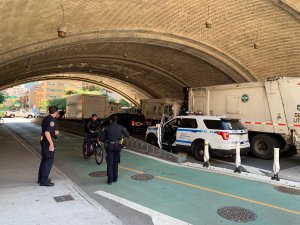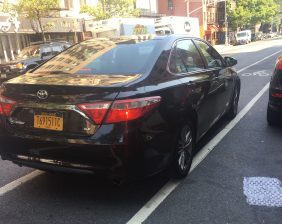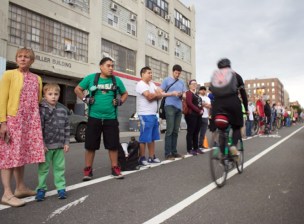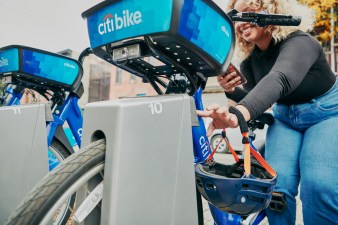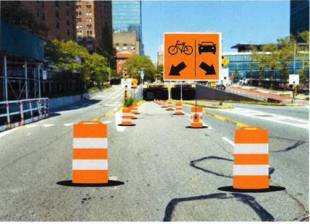OPINION: Stop the Shameful Treatment of Deliveristas
These largely immigrant strivers occupy a crucial economic niche. They deserve safety, fairness, dignity and recognition.

Advocates for delivery workers and members of the City Council will announce a package of bills on Tuesday at 2:30 at City Hall. In advance, we solicited this op-ed from Shabazz Stuart, a supporter of their work.
This past Saturday, I performed a ritual that’s familiar to millions of New Yorkers; I bought takeout on my smartphone. The experience was, dare I say, seamless; only 20 minutes after placing an order to Domo Taco on Brooklyn’s Franklin Avenue, Shilpi appeared at my front door with a fresh burrito bowl.
Shilpi arrived by bike.

It may be atypical in other parts of the nation, but in New York City the vast majority of restaurant deliveries come by bicycle — via an army of 80,000, mainly BIPOC and immigrant, workers.
Many cities would find reasons to celebrate this incredible ecosystem. For one, bike delivery workers cut down on traffic congestion by literally saving thousands of car trips a day. Their zippy e-bikes occupy only a fraction of the space as a sedan or SUV; can anyone imagine what a hundreds of thousands more car trips a day would mean for a city like ours?
Their labor also helps keep restaurants in business while raising the quality of life for city residents. Their essential role in the economy became evident during the darkest days of the pandemic, when entire neighborhoods turned to them for desperately needed revenue and sustenance.
But, most profoundly, bike delivery workers represent the best of us.
Many are immigrants; almost all are people of color. These men and women often come from unimaginable backgrounds and have made incredible sacrifices to join us in Gotham. Like many of our parents and ancestors, they came here, often speaking little English and with only the clothes on their backs, in the hopes of finding a better life and the American dream. They work hard, toiling through rain, wind, sleet and snow in order to climb the economic ladder and work their way into the middle class.
Yet, collectively, New Yorkers barely tolerate their deliveristas. In fact, many regard this thriving ecosystem as a nuisance: Incredibly, the same residents who insist on prompt dispatches from restaurants often complain of the fast bikes zipping around corners. The situation isn’t much better at restaurants, where delivery workers are often at the bottom of the totem pole — such that they are not certain they can even use the restroom. The city’s “progressive” lawmakers have also done their part, by legislating the continued harassment and disenfranchisement of the cycling delivery workers.
Yet, without complaint, the workers continue to deliver for us, and we very much need them to.

The recent murder of deliverista Fransico Villalva Vitinio, and the subsequent silence of the city’s establishment represented a new nadir for a saga already dotted with lows. Vintinio, 29, was making deliveries for DoorDash when he was confronted by thieves who demanded his e-bike — his very livelihood. Fransisco refused, and paid with. his life.
Later, his fellow delivery workers huddled alone at the crime scene — unaccompanied by community leaders, abandoned by most politicians and forgotten by the city they feed. Their distraught reactions, as captured by the Daily News, were too much to bear.
“We are like family. We all work hard. … We wonder what to do next.” one of them said.
Fransico, apparently, loved New York. But New York didn’t love him.
Every society has at least one great shame. The callous, cruel treatment of bicycle delivery workers certainly rates as one of ours. If we are to be completely honest as New Yorkers, our collective treatment of the deliveristas does not differ from that of migrant workers on the western plantation. Our mayor may boast of an egalitarian agenda, but there is nothing progressive about New York’s attitude toward some of its hardest, most reliable workers.
As the migrant worker out west is condemned to grueling working conditions, so is the deliverista, who must contend with dangerous, haphazard bicycle network, brutal weather and robbers, laboring to sustain restaurants and feed hungry city dwellers, all the while being routinely ignored by the elected leaders of this supposedly progressive city.
The only difference between the migrant farm worker and the urban delivery worker is that one picks crops in the field, the other picks up bags from restaurants.
Let me suggest a new paradigm: New York’s homegrown bicycle delivery system is as iconic and momentous as the Citi Bike or even the yellow cab. This is not to say that there aren’t challenges, but instead of nuisances, I see opportunities.
Yes, it’s true that delivery workers don’t always use e-bikes that are compliant with the letter of the law, but instead of confiscating their bicycles (and livelihoods), why can’t the city roll out its own branded e-bicycle that the deliveristas could purchase at a discount? These “NYC Delivery Bikes” could be packaged in with theft insurance and other protections, improving working conditions.
Yes, it’s true that in their haste some delivery workers ride on the sidewalk. But in recognizing that delivery workers are just trying to save time (walking a bike down a busy block can cost precious seconds), why can’t we create midblock sidewalk ramps on our busiest streets for easy access to and from the road?
Yes, it’s true that e-bikes are zippier than others, but why not improve our cycling network so that faster e-bikes and scooters can be accommodated safely?
With a renewed moral clarity and a little imagination, we can usher in a future where deliveristas are proud to walk (and bike) among us as equals, and as proud symbols of our city.
Shabazz Stuart is the founder and CEO of Oonee and a member of the StreetsPAC board. You can follow him on Twitter @ShabazzStuart.
